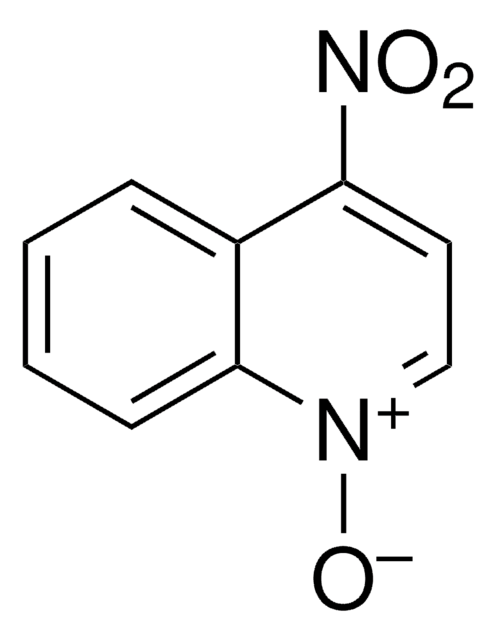10107409001
Roche
Mitomicina C
crystalline powder, 98%, pkg of 2 mg
Sinónimos:
Mitomycin C
About This Item
Productos recomendados
Quality Level
assay
98%
form
crystalline powder
mol wt
334.3
packaging
pkg of 2 mg
manufacturer/tradename
Roche
antibiotic activity spectrum
Gram-negative bacteria
Gram-positive bacteria
mode of action
DNA synthesis | interferes
storage temp.
2-8°C
InChI
1S/C15H18N4O5/c1-5-9(16)12(21)8-6(4-24-14(17)22)15(23-2)13-7(18-13)3-19(15)10(8)11(5)20/h6-7,13,18H,3-4,16H2,1-2H3,(H2,17,22)/t6-,7+,13+,15-/m1/s1
InChI key
NWIBSHFKIJFRCO-WUDYKRTCSA-N
¿Está buscando productos similares? Visita Guía de comparación de productos
General description
Application
- to cease mitosis
- in phosphate buffer saline (PBS) for inactivation and plating mouse embryonic fibroblasts (MEFs)
- as mutagen in mutagenicity assay
Biochem/physiol Actions
Other Notes
signalword
Danger
hcodes
Hazard Classifications
Acute Tox. 2 Oral - Carc. 2
Storage Class
6.1A - Combustible acute toxic Cat. 1 and 2 / very toxic hazardous materials
wgk_germany
WGK 3
flash_point_f
does not flash
flash_point_c
does not flash
Certificados de análisis (COA)
Busque Certificados de análisis (COA) introduciendo el número de lote del producto. Los números de lote se encuentran en la etiqueta del producto después de las palabras «Lot» o «Batch»
¿Ya tiene este producto?
Encuentre la documentación para los productos que ha comprado recientemente en la Biblioteca de documentos.
Los clientes también vieron
Artículos
Antibiotic kill curve is a dose response experiment in which mammalian cells are subjected to increasing amounts of selection antibiotic
Antibiotic kill curve is a dose response experiment in which mammalian cells are subjected to increasing amounts of selection antibiotic
Antibiotic kill curve is a dose response experiment in which mammalian cells are subjected to increasing amounts of selection antibiotic
Antibiotic kill curve is a dose response experiment in which mammalian cells are subjected to increasing amounts of selection antibiotic
Nuestro equipo de científicos tiene experiencia en todas las áreas de investigación: Ciencias de la vida, Ciencia de los materiales, Síntesis química, Cromatografía, Analítica y muchas otras.
Póngase en contacto con el Servicio técnico








